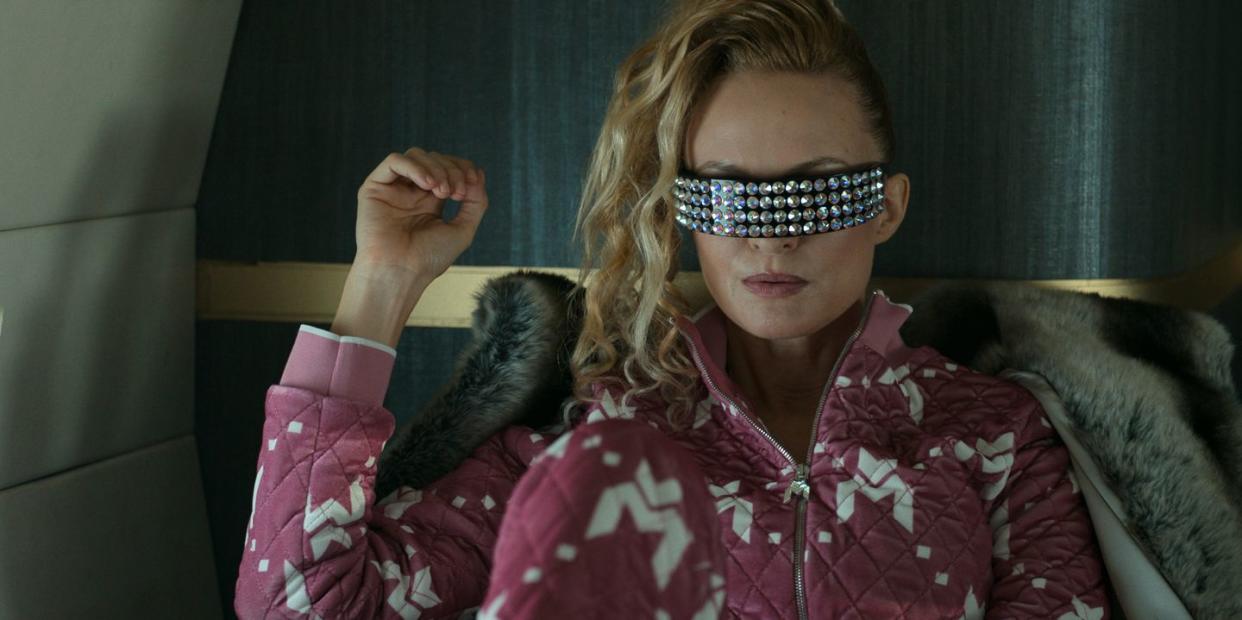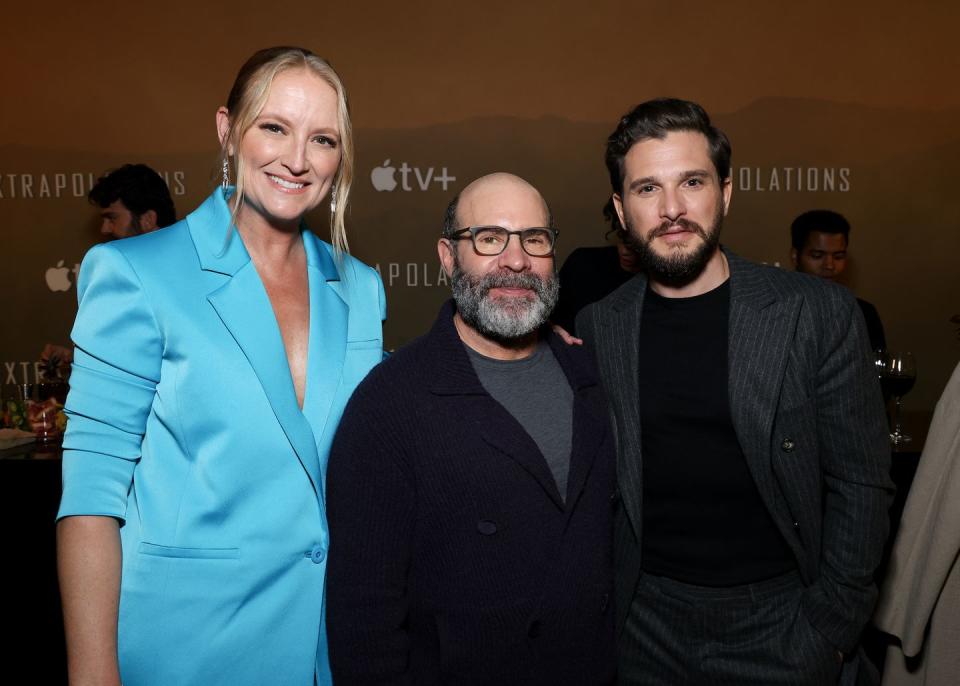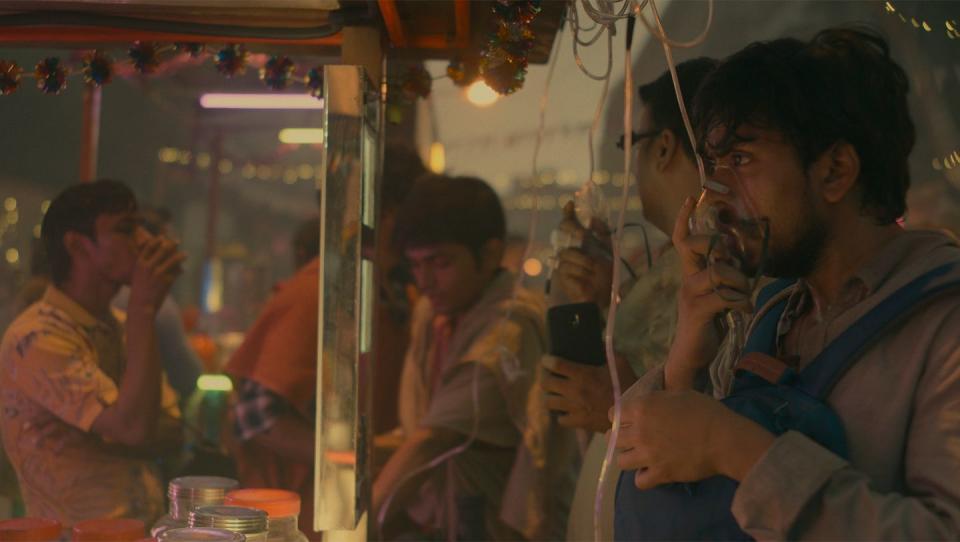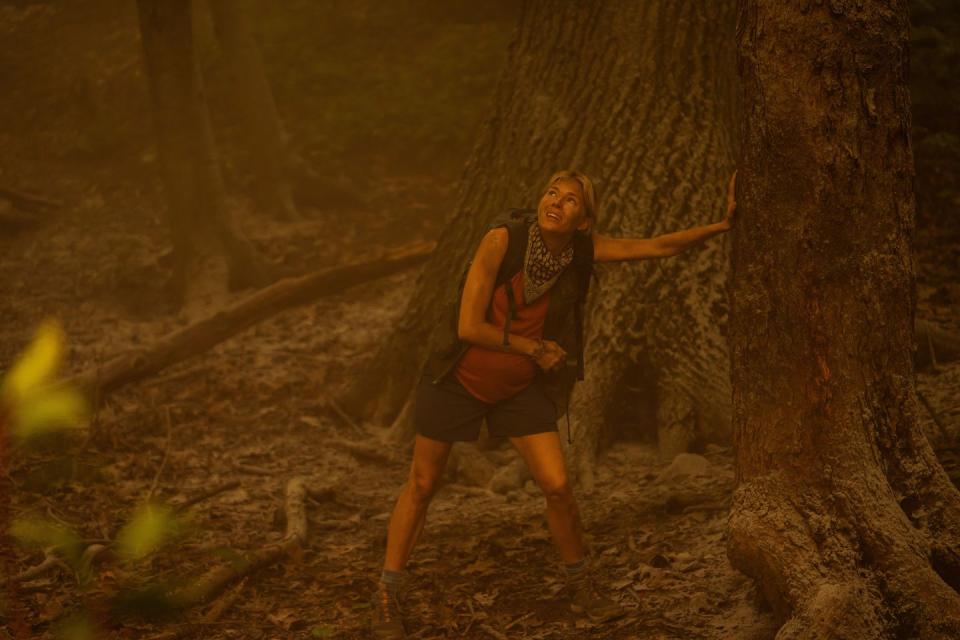'Extrapolations' Is 'Black Mirror' For the Climate Crisis

- Oops!Something went wrong.Please try again later.
- Oops!Something went wrong.Please try again later.
“Selling hope is something that the oil companies want us to do,” Scott Z. Burns tells me. “They want us to be really hopeful, because hope is inaction. Hope is passivity. Hope is surrendering your questioning ability to someone else.” It’s not being hopeful he’s critical of so much as the focus on hope—and on those same old questions that always seem to dominate discussions of climate change. Are you hopeful? Should we be hopeful? Is it all too big? Is there anything we can really do?
Burns, who wrote Contagion and The Informant! among a host of other screenplays, doesn’t think any of that matters when we have the tools to do something about this. His new series on Apple TV+, Extrapolations, forecasts our world in 2037, 2059, 2070, and the years in between should we choose not to use them. A galaxy of stars including Meryl Streep, Kit Harrington, Edward Norton, Sienna Miller, Matthew Rhys, Daveed Diggs, Marion Cotillard, Keri Russell, and Forest Whitaker help tell the tales, a collection of vignettes from “the messy middle” of our lives if we continue on our current trajectory. It's a future where we may find ourselves tearing each other apart long before the sea levels rise to swallow up all we’ve built on this planet.
Extrapolations is sprawling—Burns believes it's “the largest commitment any of the platforms have ever made to climate storytelling.” Particularly in the first couple of episodes, the dialogue can get a bit stilted as characters are tasked with providing exposition for this ominous new world. But by Episode Three (“2047”), the show hit its stride, exploring how some of us will exploit every bit of climate chaos as an opportunity, others may save what’s left with their own hands, and more will seek refuge in false worlds constructed through our escalating technological capabilities.
The climate crisis does not necessarily lend itself to on-screen portrayals. The less said about The Day After Tomorrow the better, while Don’t Look Up grasped for an allegorical way into the issue. Extrapolations is different in kind, and Burns says he was guided far more by a book—The Great Derangement—and a renowned Polish TV series exploring the Ten Commandments called The Dekalog. In the interview below, which has been edited for length and clarity, Burns explains how he went about using storytelling as a solution in this era of climate crisis.
ESQUIRE: In the fourth episode, “2059,” there’s a rogue geoengineering attempt. Edward Norton’s character tells the perpetrator that she can do what she’s doing, but it won’t change us—we will still be the same primates looking to immediately fulfill our desires after.
It’s a human thing that goes well beyond climate change. Solves that come from technology rather than behavioral change—a solve that allows you to do everything you're doing and will just make it easier.
I talked to this guy at Harvard, David Keith, who Bill McKibben was like, He's not really a professor. That chair that he has at the Kennedy School was funded by the oil companies to legitimize his work. Oil companies love geoengineering, because it means they can keep drilling and burning. I said to Keith, “How does this come into play?” He said, “Well, I think as we have more COPs and people gin up outrage about fossil fuels, I think a rogue billionaire is probably the most likely person.”
Maybe we haven’t thought enough about what's going to happen when people start taking things into their own hands.
I had episodes that got more into that, even ones that were fairly diabolical, with kids killing adults. A few years ago, when the Earth Liberation Front was a bigger thing, they were burning car dealerships in San Diego and blowing up an expansion of the Vale ski resort. We know that it's easy to get people who feel like they can't change anything unless they go there. I do worry where that climate frustration is going to start coming out. I do worry about ecoterrorism for sure, but I don't even know that it's ecoterrorism at that point. I think it's eco-opportunism.
If we’re here in 10 years, I wouldn’t put it past Elon Musk to go to the Philippines and say, You have an air force. I'm going to supply you with everything you need, and you should go up in the atmosphere and do this. And secretly the U.S. kind of wants you to do it, so they're going to publicly condemn you. Don't worry about it. You're not going to lose financing. So I do worry that we're going to see rogue actors try and do things that have global consequences.
How much did previous attempts to portray the consequences of the climate crisis factor into your planning here?
It's really influenced by The Great Derangement by an Indian author named Amitav Ghosh. What is the power of a story? When you put a story at the end of a problem like The Day After Tomorrow, it's so hard to relate to. And I think there's a confluence of factors for that. One, we have a kind of prognostic myopia. We're really good at getting food for tonight, not so good about thinking about the consequences of our actions over a longer period of time.
The other thing is that not everybody has the same event horizon for climate change. You and I have access to air conditioning and water and live in big cities. We may be able to continue the way we're living more or less for 15 years. But to someone who lives in Miami or the Marshall Islands and is not affluent and is not white, or whatever the ruling group is, I don't think that they have the same event horizon as you and I. And it spreads. When the farms failed in Syria because of drought and people moved into the cities, we saw what happened. And then you look to Germany, where all of a sudden there's a huge ballooning migration issue of displaced people. So the knock-on effects became what was most attractive to me. I wanted to work on the messy middle, not the, we're all going to die, or we're all going to live. Because no one had really done just day-to-day storytelling about what it’s going to be like to raise a kid in 15 years.

How did you balance which stories to tell? As you say, the poorest people will probably bear the brunt of this the earliest. On the flip side, the wealthy people in rich countries like ours, they will feel it later, but also have more power to change what's going to happen.
I wish we'd had more episodes, because we did think about Global North versus Global South. If you really watch the show closely, there are a lot of Easter eggs about that. In Episode Seven, on the radio broadcast you hear that someone's decided to award reparations to the Global South. And the conclusion of this [series], the notion of “ecocide”—getting the ICC [International Criminal Court] to take that on would be very meaningful. There needs to be accountability for people who look like me and you who are not suffering.
Episode Five takes place entirely in India. Episode Two takes place entirely in Cali, Colombia. We had a really great pollinator story that we didn't get to make that was set in Africa. So if I got another season, I would spend more time looking at exactly that. But even some of this is an artifact of the system. We're still in a place where most of our movie stars are white people, and Apple, if they were going to spend this much money on a show, wanted a lot of famous people in it.
In the Mumbai “2059” episode, people essentially live their lives at night because there’s a daytime curfew due to the heat, and people are breathing through oxygen masks half the time. Are you concerned that our adaptability as a species could encourage us not to address the actual conditions we’re living in?
I think it already is. When I was a producer on An Inconvenient Truth, we talked a lot about deniers, right? Well, I think the deniers are pretty much gone now, but there are climate opportunists. When you hear Mike Pompeo making a land grab for an Arctic without ice on it, and the Russians are doing that, and the Canadians—it’s the next gold rush.
We've gone from having climate deniers to, “What about adaptation? Maybe that's the right strategy, because we're not stopping it.” The Republicans kind of picked that up, and then from there, we've moved into opportunism. “How can this new planet create new opportunities?” Whether it's in clothing, in real estate development, in what a LEED home is, in extractive mining in places where it wasn't available before.
I'm just waiting for someone to come up with the tornado ride. I can imagine terrifying weather tourism being a thing.

By Episode Six, things get a bit Black Mirror-ish, including with the concept of “nostalgia therapy.” Are you worried about a future where people spend all their time trying to escape to the past?
That’s kind of what I was going for. But what I'm really concerned about is when the windows of my house can be turned into a beautiful snowfall outside on a day when I'm not allowed out. And there are other environmental controls that make it feel like nature. And I can see a bear or deer running across. As we are able to give people synthetic nature, we make real nature much more vulnerable. And that does scare me. As we see tech companies working into that space, is that one of the unintended consequences, that the world becomes less sui generis and less critical to preserve?
All those things are part of the same, [including] whether it’s more comfortable to be in some sort of “nostalgia therapy.” 106 is in a lot of ways my favorite episode, and I didn’t pull it out of my ass. I went to doctors and they said, “Well, heat stress on pregnant women is a problem. And it may be that women stop carrying for so long and so we see more and more preemie babies. It tends to increase cardiovascular issues, which is where “summer heart” [a congenital condition in children] came from. But the knock on effect of that is it also affects cognition. Because if your cardiovascular system isn't pumping enough blood to your brain, development doesn't go as well. And I worked with a neuroscientist at Columbia on that episode, and she was very comfortable with the possibility of what sort of cognitive damage all this was going to cause.
Do you think people are aware of what it being so hot is really going to mean?
No. People do die on the streets. Heat waves do kill a lot of people, more so in Europe. But I had a storyline about a couple that is in New York. Suddenly there’s a heat warning, and the man has been accused of domestic violence related to heat. And there is a correlation.
So again, I'm interested in the knock-on effect. It's not just how bad extreme heat is, it's what does it do in terms of domestic violence and law enforcement? What does it do in terms of agriculture and growing seasons? What does it do across the second- and third-order effects that people do not do a very good job of connecting the dots on?
In the Miami episode, it’s mentioned almost in passing that someone was bitten by a mosquito and now they're severely ill. Do we think enough about mosquitoes when we talk about climate?
More people on Earth die from mosquitoes every year than any other animal. And when you look at these disease bands around the globe, they're obviously tied to climate. Famously, Nairobi doesn't have a lot of malaria because it’s high enough up [elevation]. That's changed now. Disease vectors are changing. You’re seeing dengue [fever] in Florida, you’re seeing it in Chicago.
A virus is very opportunistic. The more it's out there, it's basically just a bad copying machine, and all it needs to do is make a bad copy of itself that's more dangerous, and then we have to deal with it. And mosquitoes live longer when it’s warmer. The part where they're particularly nasty, I think, extends by two days. That's a real problem, especially at the same time that we're destroying the bird population.
The show has a pessimistic view on how long it will take for the real decision-makers to face consequences, including “ecocide” tribunals. But can we truly charge one robber baron capitalist for this? I’m consuming all kinds of stuff every day.
That is Kit [Harrington]'s speech in that episode: If I'm guilty, why isn't everybody else? All I did was supply products to appetites all around me. And I find that legally compelling. I find it morally questionable, but legally very compelling. It’s not what you didn't do, it's what you did do when you knew better. And that is culpability. When oil companies say their stock is worth X or Y based on assets that are still in the ground, well, they theoretically shouldn't be allowed to drill and burn what's in the ground. So how can they claim that's part of their worth?
I don't think you can hold people culpable for what they didn't know was damaging. I do think you can hold them culpable for profiteering off of human appetites. And we know that's true because that's what happened with the cigarette companies. Kit and I had a great time with his last speech because I find it compelling. He's not guilty of doing anything other than being last in a line of people who are making money off the bounty of the earth. That's why in that episode he is not found guilty.

ExxonMobil knew back in 1980 what the consequences would be, though we didn't have another energy system we could move to back then.
That's why I say this problem is human. When people ask me if I'm pessimistic, I'm like, no. Flying into L.A., there’s rooftops for miles with nothing on them. If PG&E and the building owners could come to an agreement, there could be solar on every one of those rooftops. The problem isn't that solar doesn't work. The problem is PG&E and the rooftop owners are in some weird, complicated legal battle that goes on and on for years.
The problem isn't that we don't know how to do it. The problem is the people who are making money off of it being just this way aren't giving up and going away without a fight. None of this is—like, it is rocket science. I can’t say it’s not rocket science, but it’s really doable. It’s not an issue of whether it’s technologically available, it’s whether it’s scalable.
My faith is in human ingenuity and the almighty dollar.
I'm kind of with you. A lot of people took me to task, and I was like, I can't have a conversation anymore about capitalism and not capitalism. Because I know we're not winning that war anytime soon. So if we can use capitalism, that's our best bet, and I think we can.
It’s searching for an inflection point. How much bad shit are we going to allow before we really stop bad shit from happening? And then the right question is, bad shit to whom? We'll probably let the Marshall Islands go away, and we'll probably let a lot of the tribal peoples on the coast of Alaska lose their communities. I don't feel great about that. Will we save Manhattan? Probably. Will it require a lot of civil engineering? Yeah.
What do you hope a 15-year-old watching takes away from this? How about a 65-year-old?
For the 15-year-olds, I hope they’re not buying into these narratives that tell them this is so big and that there is no personal responsibility, that there's nothing they can do, that this is out of their hands. Because I'd like them to use the show as some sort of inoculation against cynicism on this issue.
For 65-year-olds, there is something important about acknowledging all that from the end of life as well. We didn't always know what we were doing was bad, and for that, there is forgiveness. We didn't always have a solve, and if you don't have an alternative, it's hard for me to really feel that it's right to punish those people. But now we do have solves, and we do have awareness, and I think for older people to connect those dots—that's what's beautiful about what Bill McKibben is doing now with Third Act. It's allowing older people to go, “Wait a minute. Not in my name. I did not co-sign that. That was the only [option], but it isn't anymore, so don't use me as proof of your permission to despoil the planet.”
You Might Also Like

